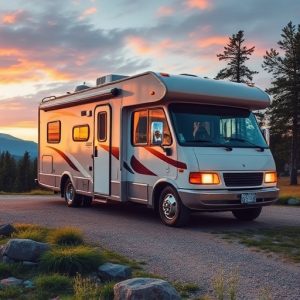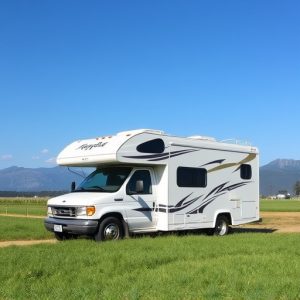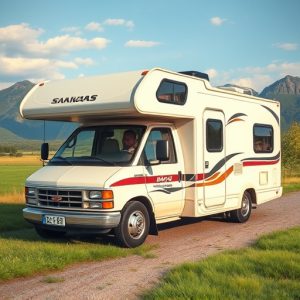Savvy RV Traveler’s Guide: Budgeting and Saving for Memorable Trips
Planning an RV trip requires careful budgeting to balance enjoyment with financial responsibility. …….
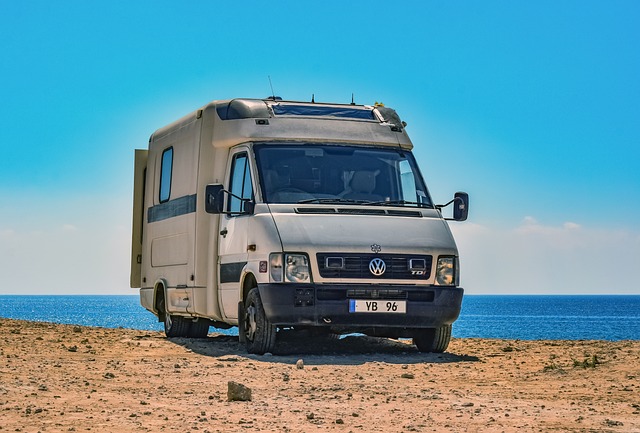
Planning an RV trip requires careful budgeting to balance enjoyment with financial responsibility. Key expenses include fuel, campsite fees, maintenance, insurance, and potential repairs, all of which should be anticipated and included in your budget. To save on fuel, plan efficient routes and consider lower-priced areas when filling up. Booking campsites in advance, especially during high demand periods, can secure better rates. RV owners can join membership programs like Passport America and Good Sam's Club for discounts at affiliated sites. Utilize public lands managed by the BLM, National Forests, and state parks for free or low-cost camping. Boondocking and meal planning with cost-effective ingredients can further reduce expenses. Implementing energy-efficient practices and solar panels helps minimize utility costs. Regular maintenance and a contingency fund for unexpected costs are essential to maintain a smooth journey. By following RV Travel Tips, travelers can navigate the financial aspects of their trip more effectively, ensuring they make the most of their adventure without overspending.
Embarking on an RV travel adventure can be a journey of discovery, offering unparalleled flexibility and comfort. To ensure your trip is both memorable and cost-effective, strategic planning and budgeting are paramount. This article equips RV enthusiasts with essential RV travel tips, guiding you through setting a realistic budget, maximizing your travel dollar with savvy hacks, finding affordable camping options across public and private lands, and understanding the maintenance costs that keep your RV in prime condition without overspending. Whether you’re a seasoned nomad or planning your first road trip, these insights will help you make the most of your RV travels.
- Strategic Planning for RV Travelers: Setting a Realistic Budget
- Maximizing Your RV Travel Dollar: Cost-Saving Hacks and Tips
- Finding Affordable Camping Spots: Exploring Public and Private Land Options
- Understanding RV Maintenance Costs: Keeping Your Vehicle in Top Condition on a Budget
Strategic Planning for RV Travelers: Setting a Realistic Budget
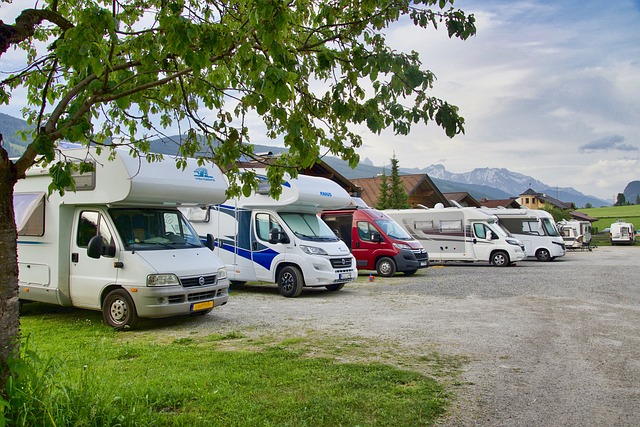
When embarking on an RV travel adventure, strategic planning is paramount to ensure a memorable and financially responsible experience. Budgeting for RV travel requires careful consideration of various cost factors to set a realistic figure that aligns with your travel goals and financial constraints. One of the first steps in this process is to estimate the cost of fuel, as the RV’s size and efficiency will significantly influence how much you’ll spend on the road. RV Travel Tips suggest calculating average mileage and expected driving distances to gauge fuel expenses accurately.
Furthermore, potential RVers should account for campsite fees, which can vary widely depending on location, amenities, and the time of year. It’s wise to book sites in advance during peak seasons to lock in rates and secure your spot. Additionally, consider the costs associated with maintenance, insurance, and unexpected repairs, as these can add up quickly. To optimize your budget, research free or discounted camping options, such as public lands managed by the Forest Service or Bureau of Land Management. Including a contingency fund for unforeseen expenses is also a prudent RV Travel Tip to ensure your journey remains enjoyable and stress-free. By meticulously planning and allocating funds for each aspect of your trip, you’ll be better equipped to navigate the financial aspects of RV travel and make the most of your adventure.
Maximizing Your RV Travel Dollar: Cost-Saving Hacks and Tips

To maximize your RV travel dollar, it’s crucial to plan and budget effectively. One of the most significant expenses in RV travel is fuel. To mitigate this cost, consider routes that are known for lower gas prices or employ fuel-efficient driving practices. Additionally, booking campsites well in advance can save you money, as rates often increase closer to your desired dates. Utilize membership programs like Passport America or Good Sam’s Club, which offer discounts on camping fees at participating locations.
Another cost-saving strategy is to take advantage of free or low-cost camping options such as BLM lands, National Forests, and state parks that do not charge a user fee. Also, consider boondocking—camping without hookups—to reduce utility costs. To further stretch your budget, plan meals around ingredients that can be stored easily, and cook in bulk to minimize waste and dining out expenses. RV travel tips for saving money also include conserving water and electricity by using energy-efficient appliances and solar panels. By being mindful of your spending and utilizing available discounts and resources, you can make the most of your RV travel budget and enjoy the journey without compromising on comfort or experience.
Finding Affordable Camping Spots: Exploring Public and Private Land Options

When planning your RV travel, a critical aspect is finding affordable camping spots that complement your budget and enhance your experience. To maximize your RV travel dollars, consider a mix of public and private land options. Public lands, managed by entities like the U.S. Forest Service or the Bureau of Land Management, often offer some of the most economical camping opportunities. These lands span vast landscapes across the country, providing a diverse range of natural settings for a nominal fee or even free of charge. Additionally, state parks and national forests are valuable resources that can accommodate RVs and offer amenities such as toilets, water points, and sometimes electrical hookups at very competitive rates.
On the other hand, private campgrounds and RV parks also present budget-friendly options, especially if you’re flexible with your travel dates and willing to take advantage of off-season rates. Many private sites offer membership or loyalty programs that can lead to significant savings over time. Moreover, using apps and websites dedicated to RVers, like Free Roam America or Harvest Hosts, can help you find free or donation-based stays at unique locations such as vineyards, farms, or museums, which not only save money but also enrich the travel experience with local charm and culture. By carefully selecting your camping spots, you can maintain a balanced budget while enjoying the full spectrum of RV travel adventures. Utilize RV travel tips that emphasize flexibility, planning, and utilizing both public and private options to ensure a cost-effective and memorable trip.
Understanding RV Maintenance Costs: Keeping Your Vehicle in Top Condition on a Budget
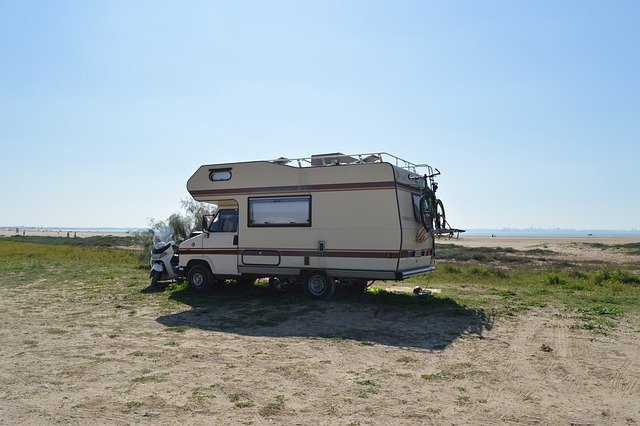
RV travel offers an unparalleled blend of comfort and adventure, allowing for exploration with the conveniences of home at your fingertips. To maintain this balance while keeping costs manageable, understanding RV maintenance costs is pivotal. Regular upkeep not only ensures your vehicle remains in top condition but also prevents unexpected expenses that can derail your travel plans. Start by creating a maintenance schedule tailored to your RV’s make and model. This schedule should include routine checks of the engine, tires, brakes, and all systems within the RV, such as plumbing, electrical, and propane systems. Budget-friendly maintenance often involves DIY tasks like cleaning filters, checking fluids, and ensuring seals are intact, which can be learned through online resources or RV forums, saving you money on professional service fees. Additionally, consider purchasing an extended warranty or service contract that covers major components and systems of your RV, offering financial protection against costly repairs. By being proactive with maintenance and informed about potential expenses, you can allocate funds effectively, ensuring your RV travel budget stretches as far as your sense of adventure. Utilize RV travel tips from experienced nomads and refer to online databases for the best deals on parts and services, which contribute to a more economical and enjoyable RV lifestyle.
Embarking on an RV journey offers unparalleled freedom and adventure, and with strategic planning, smart budgeting, and informed decision-making, your travel dollar can stretch further. By considering the practical aspects outlined in “Strategic Planning for RV Travelers: Setting a Realistic Budget,” you’ll navigate the financial landscape of RV travel confidently. The cost-saving hacks and tips detailed in “Maximizing Your RV Travel Dollar” will help you make the most of your RV travel budget, ensuring you don’t miss out on experiences due to financial constraints. Exploring both public and private land options for camping, as discussed in “Finding Affordable Camping Spots,” provides a diverse array of accommodations that cater to every budget. Lastly, understanding the maintenance costs associated with your RV, as covered in “Understanding RV Maintenance Costs: Keeping Your Vehicle in Top Condition on a Budget,” is crucial for long-term cost savings and safety. Implement these RV travel tips to enhance your journey, making memories without compromising your financial well-being. Happy trails!
